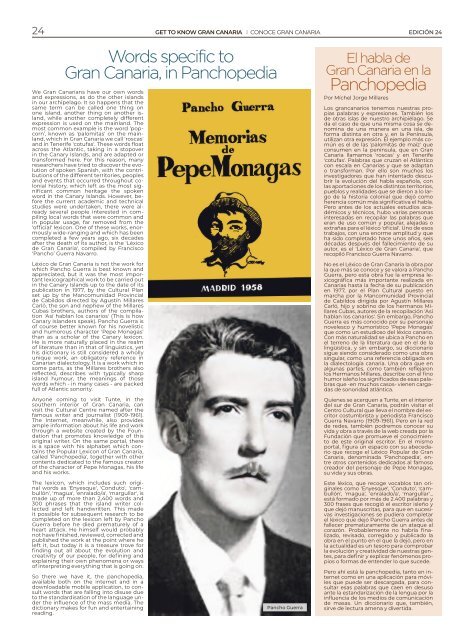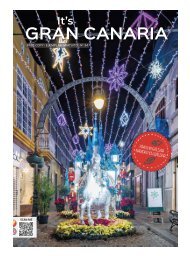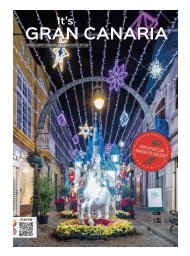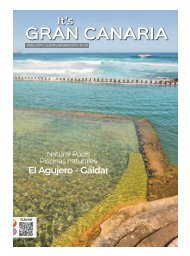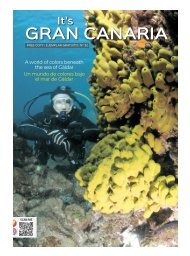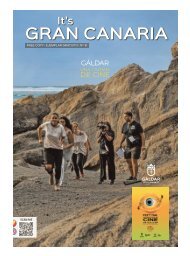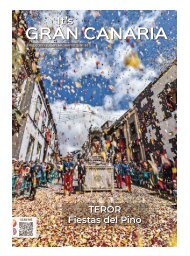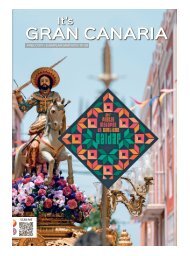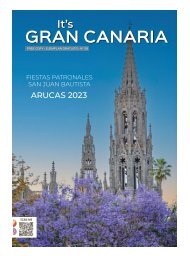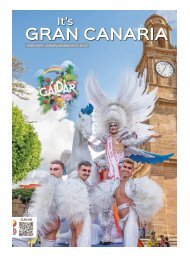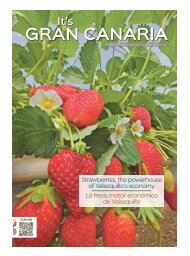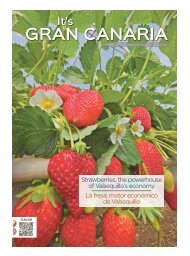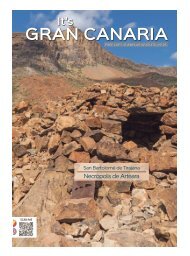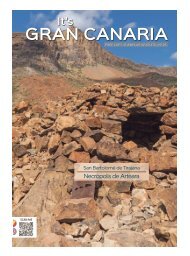No. 24 - Its Gran Canaria Magazine
Rutas, recomendaciones y noticias de Gran Canaria. Routes, tips and news about Gran Canaria.
Rutas, recomendaciones y noticias de Gran Canaria.
Routes, tips and news about Gran Canaria.
You also want an ePaper? Increase the reach of your titles
YUMPU automatically turns print PDFs into web optimized ePapers that Google loves.
<strong>24</strong><br />
GET TO KNOW GRAN CANARIA I CONOCE GRAN CANARIA EDICIÓN <strong>24</strong><br />
Words specific to<br />
<strong>Gran</strong> <strong>Canaria</strong>, in Panchopedia<br />
We <strong>Gran</strong> <strong>Canaria</strong>ns have our own words<br />
and expressions, as do the other islands<br />
in our archipelago. It so happens that the<br />
same term can be called one thing on<br />
one island, another thing on another island,<br />
while another completely different<br />
expression is used on the mainland. The<br />
most common example is the word ‘popcorn’,<br />
known as 'palomitas' on the mainland,<br />
which in <strong>Gran</strong> <strong>Canaria</strong> we call 'roscas'<br />
and in Tenerife 'cotufas'. These words float<br />
across the Atlantic, taking in a stopover<br />
in the Canary Islands, and are adapted or<br />
transformed here. For this reason, many<br />
researchers have tried to discover the evolution<br />
of spoken Spanish, with the contributions<br />
of the different territories, peoples<br />
and events that occurred throughout colonial<br />
history, which left as the most significant<br />
common heritage the spoken<br />
word in the Canary Islands. However, before<br />
the current academic and technical<br />
studies were undertaken, there were already<br />
several people interested in compiling<br />
local words that were common and<br />
in popular usage, far removed from the<br />
'official' lexicon. One of these works, enormously<br />
wide-ranging and which has been<br />
completed a few years ago, six decades<br />
after the death of its author, is the 'Léxico<br />
de <strong>Gran</strong> <strong>Canaria</strong>', compiled by Francisco<br />
‘Pancho’ Guerra Navarro.<br />
Léxico de <strong>Gran</strong> <strong>Canaria</strong> is not the work for<br />
which Pancho Guerra is best known and<br />
appreciated, but it was the most important<br />
lexicographical work to be carried out<br />
in the Canary Islands up to the date of its<br />
publication in 1977, by the Cultural Plan<br />
set up by the Mancomunidad Provincial<br />
de Cabildos directed by Agustín Millares<br />
Carló, the son and nephew of the Millares<br />
Cubas brothers, authors of the compilation<br />
'Así hablan los canarios' (This is how<br />
Canary Islanders speak). Pancho Guerra is<br />
of course better known for his novelistic<br />
and humorous character 'Pepe Monagas'<br />
than as a scholar of the Canary lexicon.<br />
He is more naturally placed in the realm<br />
of literature than in that of linguistics, yet<br />
his dictionary is still considered a wholly<br />
unique work, an obligatory reference in<br />
<strong>Canaria</strong>n dialectology. It is a work which in<br />
some parts, as the Millares brothers also<br />
reflected, describes with typically sharp<br />
island humour, the meanings of those<br />
words which - in many cases - are packed<br />
full of Atlantic sonority.<br />
Anyone coming to visit Tunte, in the<br />
southern interior of <strong>Gran</strong> <strong>Canaria</strong>, can<br />
visit the Cultural Centre named after the<br />
famous writer and journalist (1909-1961).<br />
The Internet, meanwhile, also provides<br />
ample information about his life and work<br />
through a website created by the Foundation<br />
that promotes knowledge of this<br />
original writer. On the same portal, there<br />
is a space with his alphabet which contains<br />
the Popular Lexicon of <strong>Gran</strong> <strong>Canaria</strong>,<br />
called 'Panchopedia', together with other<br />
contents dedicated to the famous creator<br />
of the character of Pepe Monagas, his life<br />
and his works.<br />
The lexicon, which includes such original<br />
words as 'Enyesque', 'Conduto', 'cambullón',<br />
'magua', 'enralado/a', 'margullar', is<br />
made up of more than 2,400 words and<br />
300 phrases that the island writer collected<br />
and left handwritten. This made<br />
it possible for subsequent research to be<br />
completed on the lexicon left by Pancho<br />
Guerra before he died prematurely of a<br />
heart attack. He himself would probably<br />
not have finished, reviewed, corrected and<br />
published the work at the point where he<br />
left it, but today it is a treasure trove for<br />
finding out all about the evolution and<br />
creativity of our people, for defining and<br />
explaining their own phenomena or ways<br />
of interpreting everything that is going on.<br />
So there we have it, the panchopedia,<br />
available both on the internet and in a<br />
downloadable mobile application, to consult<br />
words that are falling into disuse due<br />
to the standardisation of the language under<br />
the influence of the mass media. The<br />
dictionary makes for fun and entertaining<br />
reading.<br />
Pancho Guerra<br />
El habla de<br />
<strong>Gran</strong> <strong>Canaria</strong> en la<br />
Panchopedia<br />
Por Míchel Jorge Millares<br />
Los grancanarios tenemos nuestras propias<br />
palabras y expresiones. También los<br />
de otras islas de nuestro archipiélago. Se<br />
da el caso de que una misma cosa se denomina<br />
de una manera en una isla, de<br />
forma distinta en otra y, en la Península,<br />
utilizan otra expresión. El ejemplo más común<br />
es el de las 'palomitas de maíz' que<br />
consumen en la península, que en <strong>Gran</strong><br />
<strong>Canaria</strong> llamamos 'roscas' y en Tenerife<br />
'cotufas'. Palabras que cruzan el Atlántico<br />
con escala en <strong>Canaria</strong>s y que se adaptan<br />
o transforman. Por ello son muchos los<br />
investigadores que han intentado descubrir<br />
la evolución del habla española, con<br />
las aportaciones de los distintos territorios,<br />
pueblos y realidades que se dieron a lo largo<br />
de la historia colonial que dejó como<br />
herencia común más significativa el habla.<br />
Pero antes de los actuales estudios académicos<br />
y técnicos, hubo varias personas<br />
interesadas en recopilar las palabras que<br />
eran de uso común y popular, alejadas o<br />
extrañas para el léxico 'oficial'. Uno de esos<br />
trabajos, con una enorme amplitud y que<br />
ha sido completado hace unos años, seis<br />
décadas después del fallecimiento de su<br />
autor, es el 'Léxico de <strong>Gran</strong> <strong>Canaria</strong>', que<br />
recopiló Francisco Guerra Navarro.<br />
<strong>No</strong> es el Léxico de <strong>Gran</strong> <strong>Canaria</strong> la obra por<br />
la que más se conoce y se valora a Pancho<br />
Guerra, pero esta obra fue la empresa lexicográfica<br />
más importante realizada en<br />
<strong>Canaria</strong>s hasta la fecha de su publicación<br />
en 1977, por el Plan Cultural puesto en<br />
marcha por la Mancomunidad Provincial<br />
de Cabildos dirigida por Agustín Millares<br />
Carló, hijo y sobrino de los hermanos Millares<br />
Cubas, autores de la recopilación 'Así<br />
hablan los canarios'. Sin embargo, Pancho<br />
Guerra es más conocido por su personaje<br />
novelesco y humorístico 'Pepe Monagas'<br />
que como un estudioso del léxico canario.<br />
Con más naturalidad se ubica a Pancho en<br />
el terreno de la literatura que en el de la<br />
lingüística, y sin embargo, su diccionario<br />
sigue siendo considerado como una obra<br />
singular, como una referencia obligada en<br />
la dialectología canaria. Una obra que en<br />
algunas partes, como también reflejaron<br />
los Hermanos Millares, describe con el fino<br />
humor isleño los significados de esas palabras<br />
que -en muchos casos- vienen cargadas<br />
de sonoridad atlántica.<br />
Quienes se acerquen a Tunte, en el interior<br />
del sur de <strong>Gran</strong> <strong>Canaria</strong>, podrán visitar el<br />
Centro Cultural que lleva el nombre del escritor<br />
costumbrista y periodista Francisco<br />
Guerra Navarro (1909-1961). Pero en la red<br />
de redes, también podremos conocer su<br />
vida y obra a través de la web creada por la<br />
Fundación que promueve el conocimiento<br />
de este original escritor. En el mismo<br />
portal, figura un espacio con su abecedario<br />
que recoge el Léxico Popular de <strong>Gran</strong><br />
<strong>Canaria</strong>, denominada 'Panchopedia', entre<br />
otros contenidos dedicados al famoso<br />
creador del personaje de Pepe Monagas,<br />
su vida y sus obras.<br />
Este léxico, que recoge vocablos tan originales<br />
como 'Enyesque', 'Conduto', 'cambullón',<br />
'magua', 'enralado/a', 'margullar'...<br />
está formado por más de 2.400 palabras y<br />
300 frases que recogió el escritor isleño y<br />
que dejó manuscritas, para que en sucesivas<br />
investigaciones se pudiera completar<br />
el léxico que dejó Pancho Guerra antes de<br />
fallecer prematuramente de un ataque al<br />
corazón. Probablemente no habría finalizado,<br />
revisado, corregido y publicado la<br />
obra en el punto en el que la dejó, pero en<br />
la actualidad es un tesoro para comprobar<br />
la evolución y creatividad de nuestras gentes,<br />
para definir y explicar fenómenos propios<br />
o formas de entender lo que sucede.<br />
Pero ahí está la panchopedia, tanto en internet<br />
como en una aplicación para móviles<br />
que puede ser descargada, para consultar<br />
esas palabras que caen en desuso<br />
ante la estandarización de la lengua por la<br />
influencia de los medios de comunicación<br />
de masas. Un diccionario que, también,<br />
sirve de lectura amena y divertida.


